
AI in Healthcare: Upgrading Doctors, Not Replacing Them
Introduction to Artificial Intelligence in Medicine and Healthcare
AI in healthcare is reshaping how we approach medical care, not by taking over from doctors, but by boosting their abilities in ways we couldn’t imagine just a few years ago. Picture a world where routine tasks are handled seamlessly, allowing physicians to spend more time connecting with patients on a personal level. Artificial intelligence in medicine and healthcare is all about collaboration, from spotting diseases early to tailoring treatments, and it’s already making a real difference in outcomes.
The Evolving Role of AI in Healthcare
At its core, AI in healthcare involves smart algorithms that analyze vast amounts of data to support medical decisions. These tools are designed to ease the load on healthcare workers, making processes faster and more accurate without diminishing the human element. For instance, imagine a doctor reviewing an X-ray; with AI’s help, potential issues can be flagged instantly, giving them more time to focus on compassionate care.
Key Benefits of AI in Healthcare for Doctors and Patients
One of the standout advantages is enhanced diagnostic accuracy. AI algorithms can sift through medical images like X-rays or MRIs in seconds, often catching subtle signs of conditions such as breast cancer that might be overlooked by the human eye. According to a study from the National Institutes of Health, this precision has led to earlier detections and better survival rates[2].
Then there’s the shift toward personalized medicine, where AI in healthcare uses genetic data and lifestyle factors to create custom treatment plans. Have you ever wondered what it would be like if your therapy was fine-tuned just for you? That’s the promise here—reducing side effects and speeding up recovery, as evidenced by ongoing research in big data applications.
- Efficient risk prediction: Machine learning models can forecast issues like heart failure, enabling proactive interventions that save lives.
- AI also streamlines administrative workflows, automating everything from scheduling appointments to sending reminders, so doctors can prioritize patient interactions.
- For chronic disease management, AI systems monitor data in real-time, offering suggestions that help patients maintain their health and cut down on costs.
This integration of AI in healthcare isn’t just about efficiency; it’s about empowering doctors to deliver care that’s both effective and empathetic.
How AI in Healthcare Complements Medical Professionals
Far from replacing doctors, AI in healthcare acts as a reliable partner, handling the heavy lifting of data analysis while doctors bring their expertise to the table. Think of it as a dynamic duo: AI processes information at lightning speed, and humans provide the intuition and emotional support that machines can’t replicate.
AI as a Support Tool in Healthcare Decisions
AI-driven systems offer real-time insights based on the latest research, helping doctors make spot-on decisions. Tools like IBM Watson Health, for example, align closely with physician recommendations, minimizing errors and enhancing confidence. But here’s a question: How often do you think a second opinion from AI could change a diagnosis for the better?
In practice, this means doctors can dedicate more energy to complex cases and building trust with patients, rather than getting bogged down in routine checks.
Redefining Professional Roles with AI in Healthcare
- Doctors excel in areas like patient communication and nuanced care, while AI tackles repetitive tasks and sifts through mountains of data.
- This partnership accelerates innovation, from faster diagnoses to groundbreaking treatments, creating a more balanced healthcare ecosystem.
- Consider a hypothetical scenario: A rural clinic uses AI to analyze lab results overnight, allowing the doctor to start the day with actionable insights and more time for community outreach.
Challenges Facing AI in Healthcare Implementation
While the potential of AI in healthcare is exciting, it’s not without hurdles. Issues like data privacy and bias can undermine trust, so addressing them head-on is crucial for widespread adoption.
Data Privacy and Security in AI in Healthcare
Healthcare data is incredibly sensitive, and with AI relying on large datasets, protecting it from breaches is a top priority. Organizations must implement robust safeguards to prevent misuse, as highlighted in reports from cybersecurity experts. What if a data leak exposed personal health information? That’s a risk we can’t ignore, and it’s why regulations like HIPAA are more important than ever.
Bias and Fairness Issues in Healthcare AI
AI systems learn from existing data, which means if that data is skewed, the results can perpetuate inequalities. For underrepresented groups, this might mean less accurate diagnoses, as noted in studies from trusted sources like the World Health Organization. To counter this, developers are working on diverse datasets to ensure AI in healthcare serves everyone equally.
Accountability is another layer; AI’s “black box” nature makes it tough to explain decisions, which complicates responsibility in medical errors.
Building Trust and Adoption for AI in Healthcare
- Some professionals hesitate to rely on AI, fearing it might overshadow their judgment, but education can bridge that gap.
- Patients, too, worry about losing the human touch, so transparent communication about AI’s role is key to fostering acceptance.
Best Practices for Seamlessly Integrating AI in Healthcare
To make AI in healthcare a success, focus on ethical strategies that prioritize safety and inclusivity. Here’s how organizations can get it right.
Ensuring High-Quality Data in AI for Healthcare
- Start with diverse data collection to avoid biases and regularly audit systems for accuracy.
- Use privacy tools like encryption to protect patient information, turning potential risks into strengths.
- Actionable tip: Healthcare teams could implement routine checks, ensuring AI tools evolve with new data.
Promoting Transparency in AI Healthcare Applications
- Develop explainable AI so doctors can understand and trust recommendations without second-guessing.
- Set clear accountability protocols, involving collaboration between tech experts and medical staff.
- Ethical guidelines, backed by global standards, help navigate regulations and build a framework for responsible use.
The Future Outlook for AI in Healthcare
Looking ahead, AI in healthcare will continue to evolve, driving advancements in precision medicine and public health. Imagine AI predicting outbreaks before they happen, giving doctors the edge in prevention. This future hinges on ongoing collaboration, with humans and machines working together for better outcomes.
Yet, we must keep the conversation going—about oversight, ethics, and how to make these tools accessible. It’s an exciting path, full of potential for innovation.
Wrapping Up: The Human-AI Partnership in Healthcare
Ultimately, AI in healthcare is about enhancement, not elimination. It equips doctors with powerful tools to provide superior care, from personalized treatments to efficient operations. As we move forward, let’s remember that the best results come from blending technology with human compassion.
If you’re a healthcare professional or just curious about this topic, what are your thoughts on AI’s role? Share your experiences in the comments, explore more on our site, or check out related articles for deeper insights. Let’s keep the dialogue open—your input could spark the next big idea.
References
- HI-TRUST Alliance. (n.d.). *The Pros and Cons of AI in Healthcare*. Retrieved from https://hitrustalliance.net/blog/the-pros-and-cons-of-ai-in-healthcare.
- PubMed Central. (2022). *AI in Healthcare: Opportunities and Challenges*. Retrieved from https://pmc.ncbi.nlm.nih.gov/articles/PMC9557803/.
- PubMed Central. (2024). *Advancements in Medical AI*. Retrieved from https://pmc.ncbi.nlm.nih.gov/articles/PMC11612599/.
- MedPro Group. (n.d.). *Challenges and Risks of Artificial Intelligence in Healthcare*. Retrieved from https://www.medpro.com/challenges-risks-artificial-intelligence.
- AI Multiple. (n.d.). *Healthcare AI Research*. Retrieved from https://research.aimultiple.com/healthcare-ai/.
- Officite. (n.d.). *Ranking with AI in Medical SEO*. Retrieved from https://www.officite.com/dominating-google-rankings-with-ai-expert-medical-seo-strategies-for-private-practices/.
- Medical Economics. (n.d.). *AI in Health Care: The Risks and Benefits*. Retrieved from https://www.medicaleconomics.com/view/ai-in-health-care-the-risks-and-benefits.
- Hypotenuse AI. (n.d.). *AI Writer Tools*. Retrieved from https://www.hypotenuse.ai/ai-writer.
AI in healthcare, Artificial intelligence, Healthcare technology, Medical AI, Doctors and AI, AI ethics, Data privacy in healthcare, Personalized medicine, Diagnostic accuracy, Future of medicine





